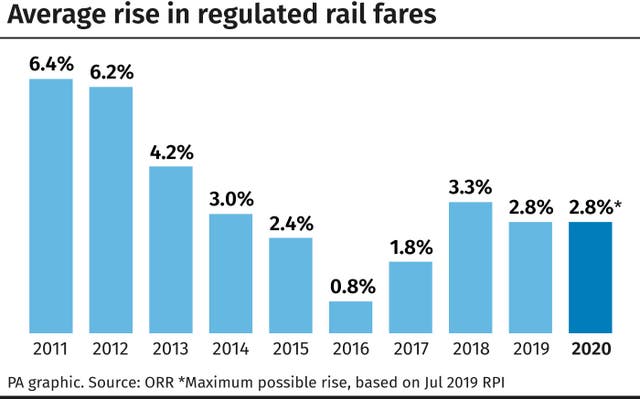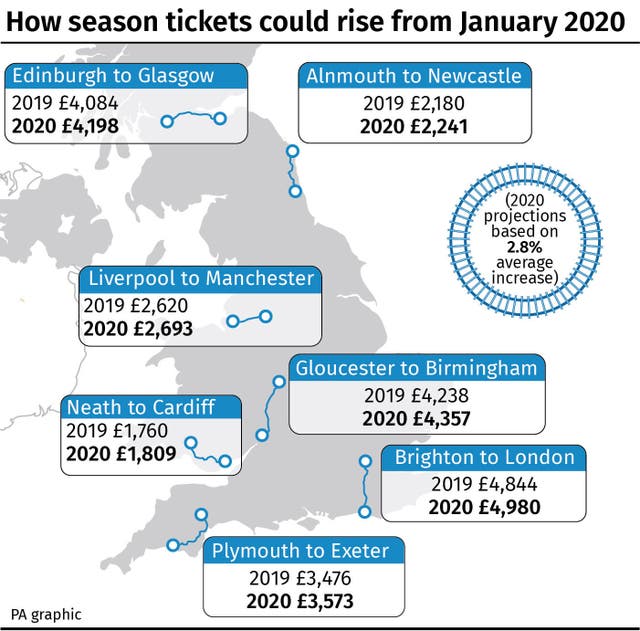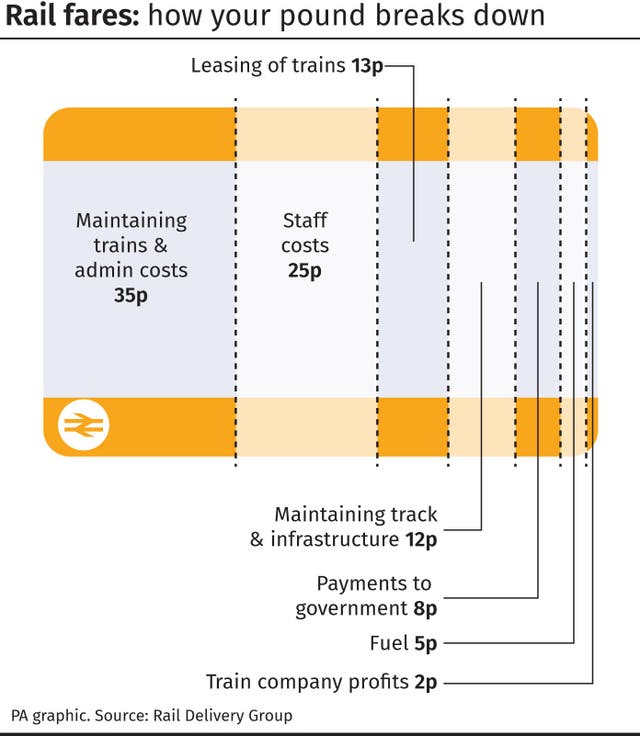
Rail commuters face an increase in season ticket costs next year of almost 3%.
The cap on the annual rise in regulated fares is linked to July’s rate of Retail Prices Index (RPI) inflation, which was announced by the Office for National Statistics as 2.8%.
Rail campaign groups warned that commuters will “refuse to pay” if season ticket prices continue to be hiked.
They have also called for the lower Consumer Prices Index (CPI) measure of inflation to be used to set fare increases, which are implemented from January 2 2020.
The CPI rate increased to 2.1% last month, the ONS said.

The UK, Scottish and Welsh Governments regulate rises in around half of fares, including season tickets on most commuter routes, some off-peak return tickets on long-distance journeys and tickets for travel around major cities at any time.
A cap on how much they can be increased is pegged to the July RPI figure, except for off-peak fares in Scotland for which RPI-1% is used.
Rail regulator the Office of Rail and Road said regulated fares went up by an average of 2.8% in January 2019, following the July 2018 RPI figure of 3.2%.

A 2.8% rise in season ticket prices would lead to an increase of more than £100 in the annual cost of getting to work for many commuters.
Examples of potential season ticket increases include:
– Brighton to London: Increase of £125 to £4,581
– Gloucester to Birmingham: Increase of £119 to £4,357
– Barrow-in-Furness to Preston: Increase of £117 to £4,285
– Edinburgh to Glasgow: Increase of £114 to £4,198
Transport Secretary Grant Shapps said he was “not delighted” about increasing rail fares.
He told BBC Radio 4’s Today programme earlier on Wednesday: “I’m not delighted by it, to be perfectly honest, as a train commuter.

“The truth is we do now have a situation where average wages are going up faster than inflation, so if you don’t keep this tracking with inflation you are actually effectively putting less money into transport and less money into trains and you won’t get them running on time doing that either.”
Shadow transport secretary Andy McDonald said: “Every year commuters are being asked to pay more money for bad train services.
“The Government has sat back and allowed private train companies to cash in while people’s pay has been held back. Continuous fare rises undermine urgent action to tackle the climate emergency by pricing people off the railways.
“Labour will bring our railways into public ownership so they are run in the interests of passengers, not private profit.”
Research by passenger watchdog Transport Focus shows that fewer than a third (30%) of rail commuters are satisfied with the value for money of their ticket.
The organisation’s director, David Sidebottom, said:” Transport Focus believes it’s time for a fairer, clearer fares formula based on calculations that use the Consumer Prices Index, rather than the discredited Retail Price Index.
“After recent disruption and a lot of misery over last winter, rail operators still have a great deal to improve.”
Bruce Williamson, spokesman for campaign group Railfuture, told the PA news agency: “It might be that we’ve now reached the point where we cannot simply put fares up and expect passengers to take the hit.
“They will just give up and refuse to pay. They will either find either another job or another form of transport.”
Jack Pinkham, an account manager from St Albans, commutes into London once a week and experiences delays on most of his journeys.
Asked if the service was reflected in the price he pays, the 24-year-old, who spends around £30 per trip, said: “When it’s delayed absolutely not, which is more than not nowadays.”


Comments: Our rules
We want our comments to be a lively and valuable part of our community - a place where readers can debate and engage with the most important local issues. The ability to comment on our stories is a privilege, not a right, however, and that privilege may be withdrawn if it is abused or misused.
Please report any comments that break our rules.
Read the rules here